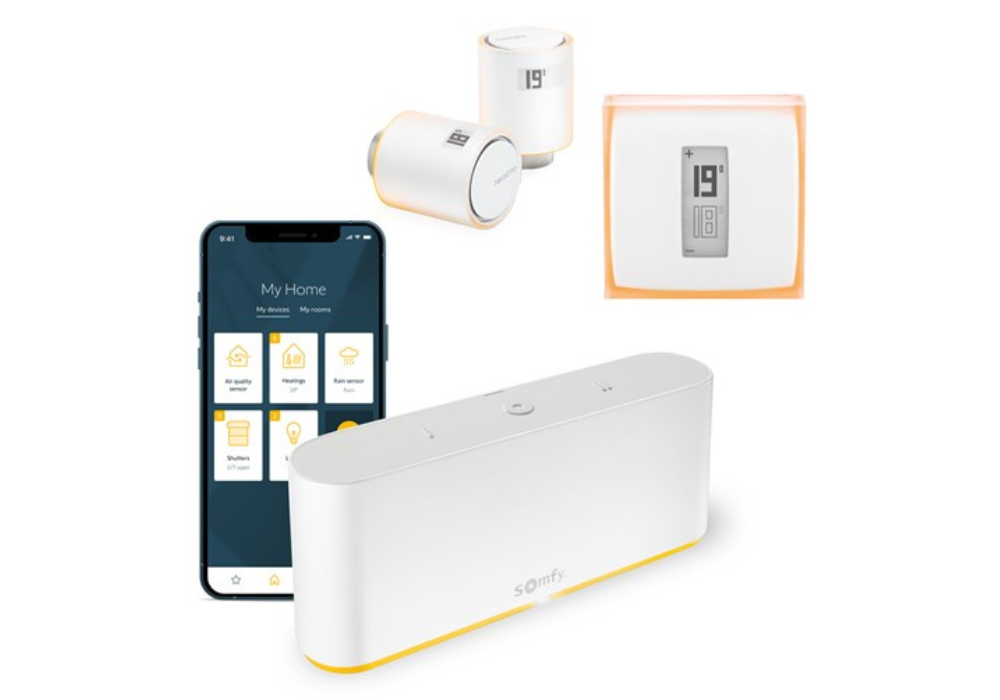
Netatmo utökar samarbete med Somfy

Electric heaters are portable heating devices that - you guessed it - run on electrical energy to boost the heating levels in any room you choose. Usually, you’ll be using electric heaters as auxiliary heating devices to support your central heating system.
Electric heaters work best in smaller rooms, such as bathrooms and garages, to add a quick, intense burst of heating into the space. More advanced electric heaters can also provide highly effective heating in larger spaces, such as bedrooms and living rooms. Of course, this rapid burst of heating does mean that electric heaters have a high level of energy consumption, which of course carries its own price tag.
There are many types of electric heaters out there to choose from: inertia electric heaters, vertical or horizontal electric heaters, steel, aluminium or cast iron electric heaters, and so on. With so much variety, how should you go about choosing the right electric heater for your home heating?
In the past, electric heaters were pretty energy intensive and not very energy efficient. This meant that electric heaters didn’t provide great levels of heating for the amount of energy they consumed. What’s more, electric heaters had very low levels of inertia, meaning that they didn’t continue to emit stored heat after they’d been turned off (this is how inertia heaters work in general).
In terms of better quality across heating, energy efficiency and inertia options, it’s best to opt for a mid- to high-price range electric heater to boost your home heating.
Did you know that you can automatically regulate your home heating with the Muller Intuitiv with Netatmo electric heater connection module? Synchronise all the electric heaters you use for your home heating - it’ll help you keep an eye on the price of running them, too!
Classic electric heaters have low levels of inertia, meaning they have low energy efficiency. The price of running them is therefore higher compared to electric heaters with higher efficiency levels. Electric heaters with fans are also common - these models also consume high levels of electrical energy.
If you need extra heating in the bathroom, electric towel heaters can be a great option to boost heating in that space. Inertia electric heaters are also an interesting option, due to their improved energy efficiency.
Electric heating can also be installed under the floors in your home, introducing great levels of thermal comfort from room to room. However, this type of electric heating does consume high levels of energy, meaning the warmth comes at a price.
Below, we’ll take a look at key factors to consider before you purchase electric heaters to boost your home heating.
Electric heaters don’t really heat up the walls, objects and bodies themselves in the room that they’re heating. They do, however, work by heating up the air that circulates through the room.
This means that, in order for your electric heaters to work as well as possible, you’ll need to ensure the room is well insulated. If not, the heat generated will simply escape through the walls! So, the price of running your electric heater will skyrocket, without actually heating the room very much at all.
Rather than purchasing a high quality electric heater with good inertia levels and using it in a poorly insulated room, the smarter option is insulating the room well first, then purchasing your electric heater.
This depends on the nature of the room: if it’s a bathroom, you won’t need heating constantly (maybe just temporarily when you use the space most in the mornings and evenings).
However, if you’re looking at electric heaters to boost heating in a living space, such as a lounge, you’ll want to look at electric heaters with longer-term effects. For that level of energy efficiency, you'll want to look at inertia electric heaters.
Regulating the price of your energy bill is far easier with programmable electric heaters. On more advanced electric heaters, you can regulate and adjust the heating output and energy consumption.
This means you can optimise your energy consumption by turning off your electric heaters when you’re away from the home. Plus, you can turn on the electric heaters so that they heat up the rooms in your home before you spend time in them!
These portable devices don’t take up much space, especially the vertical models. These are best for bathrooms and other smaller spaces.
Horizontal heaters are also a handy option, depending on the layout of the room you want to heat.
These days, electric heaters have improved a lot. They’re now far more energy efficient and there are inertia electric heater models available. However, it’s worth bearing in mind that the majority of affordable electric heaters still consume very high levels of electrical energy, at a pretty high price.
Remember to optimise your insulation before purchasing your electric heater to ensure it works as energy efficiently as possible. You can also fit your electric heater model precisely to the layout of the room where you need added heating.
There are a variety of electric heaters out there to choose from, with a range of values in terms of energy consumption, energy efficiency and energy performance. Choose the right one for your home heating!